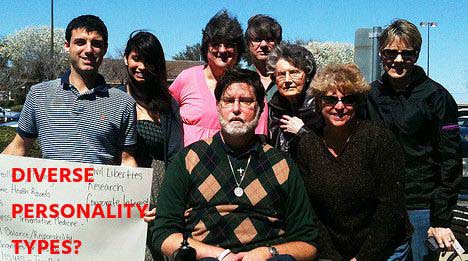Just My Type: Jungian Personality Theory & Why It Matters

Many people know Jungian personality theory; it’s the basis of the Myers-Briggs Type Indicator and other major tests of personality type.
Also, Jung invented terms like “introvert” and “extrovert”, which are still commonly used and discussed today.
What’s less well known is how Jung used these terms, and why he thought that they were important for people’s /a-midlife-transition work. I think that he had some great insights, which are well worth considering.
The following SlideShare is a thumbnail sketch of Jungian personality theory:
The Inferior Orientation and Function
Each personality type has areas of strength, and areas where its capabilities are very weak and limited. When it comes to orientation, the introvert may quite inept in certain types of social situations. Similarly, the extrovert may find him- or herself lost when it comes to understanding or even accepting thoughts and feelings that well up from deep inside.
Likewise, a person strong in any one function will face dire difficulty coming to terms with at least one other function. The true thinking type will have difficulty accessing her feeling; the feeling type his thinking; the sensation type will be all at sea and scared of his intuition; and the intuitive may be blissfully disconnected from his sensation.
Yet, it’s very important for psychological completeness, and for just being comfortable in our lives, that we start to come to terms with these undeveloped and unexplored parts of our personalities. This is an on-going aspect of /a-midlife-transition.

The Problem with Many Approaches to Personality Type
Many otherwise good writers on the subject of personality type have a static view of the personality. They seem to just feel that once you’re learned that you’re an introverted person with a strong thinking and a fairly strong intuition, you’ve learned all that you need to learn for career, relationships and basically the rest of your life.
However, this is far from true. Our personality type moves and shifts as we progress through the life journey. For instance, a person who is strongly extroverted in their 20s may find that they are considerably more introverted by the time they arrive in their 50s. This is an important thing to know, and it makes a huge difference in our lives — career and vocation, love life, recreation, and family life. In Jungian work, we need to be aware of our typology, and we need to be aware of how it’s changing.
What’s Trying to Emerge — In You?
So, it’s important to know your personality type. Otherwise, many aspects of your personality will remain inexplicable to you. Yet, it’s also very important to start to discern where new things are beginning, in the form of new attractions, new stirrings in the unconscious, and new types of reactions to people in your life.
One of the most important parts of /a-midlife-transition work, can be experiencing your personality type, and also developing awareness of changes in personality type as part of the journey to wholeness and the undiscovered self.
Brian Collinson, Registered Psychotherapist & Jungian Analyst
[cta]
PHOTOS: 
 © Coffee Party USA ; This is Edinburgh
© Coffee Party USA ; This is Edinburgh
© 2015 Brian Collinson, 2238 Constance Drive Oakville, Ontario (near Mississauga)

